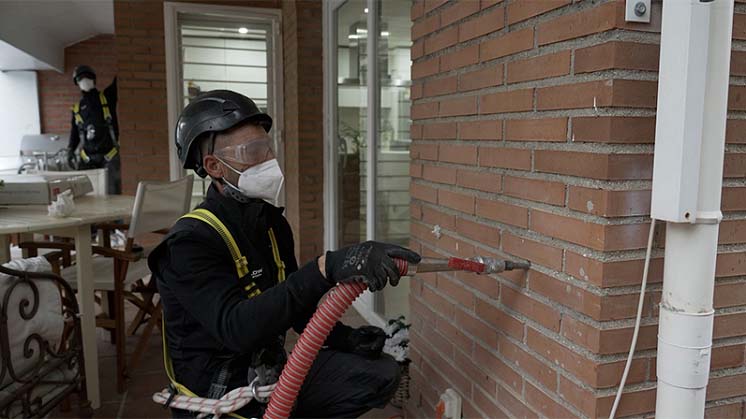We record up to 50% savings in gas and electricity consumption with our insulation service
-
With the aim of optimising the efficient use of energy, the company launched its campaign to promote thermal insulation last autumn.
-
One out of every three dwellings in Spain was built between 1960 and 1980, the category with the greatest potential for savings and efficiency improvements.
Iberdrola is already observing the results of the first winter for customers who have improved the insulation in their homes through the Smart insulation  Enlace externo, se abre en ventana nueva. service. The energy savings are produced regardless of the heating system used. In the homes studied, gas and electricity consumption is reduced by up to 50%.
Enlace externo, se abre en ventana nueva. service. The energy savings are produced regardless of the heating system used. In the homes studied, gas and electricity consumption is reduced by up to 50%.

Reducing air conditioning needs is a fundamental pillar for decarbonisation. With the aim of optimising the efficient use of energy, Iberdrola launched its campaign last autumn to promote the thermal insulation of homes through Smart Clima. Since then, the company has helped more than 400 customers to reduce their consumption, while at the same time helping to reduce emissions and improve the environment.
In high-rise dwellings, gas and electricity consumption for heating can be reduced by up to 40% compared to previous years, while in single-family houses the savings can be up to 35% - which with a free-rate gas heating system means savings of around €300 and €700 respectively - with a total investment of around €1000 in the case of high-rise dwellings and €2000 in the case of single-family houses.
In summer, insulation allows electricity consumption for cooling to be reduced by up to 50%, a saving that is added to the increased comfort in homes by introducing a passive cooling system that means the building needs less air-conditioning.
Increased savings potential
In Spain, more than one out of every three houses was built between 1960 and 1980, the category with the greatest potential for saving on energy bills and improving energy efficiency through insulation, as the vast majority of these houses lack pre-insulation in the cavity.
The potential increases even more in single-family houses, penthouses and top floors, as they are more exposed. In these cases, when work is carried out on façades and roofs, savings and comfort are enhanced.
Specifically, in single-family homes built between 1960 and 1980, the reduction in the bill is up to €700 per year, with a gas price of 10 cts/kWh. An impact that in the case of more recently built homes (1990s) is up to €500 per year.
High-rise dwellings built before 1981 can achieve savings of up to €300 per year with a gas price of 10 cts/kWh. Whereas, for the same type of dwellings, but built in the 1990s, the reduction recorded is up to €200 per year.
Key pillar for decarbonisation
Iberdrola's thermal insulation solution makes it possible to mitigate energy losses definitively in a single day, without the need to carry out work in the home. In addition, the company encourages several or even all the neighbours in a block to undertake the improvement at the same time, thus being able to pass on more advantageous prices to customers by gaining efficiency in the installation.
Insulation is carried out by filling the air chambers between the outer face of the building and the wall of the dwelling with glass mineral wool. This double partition is common in at least four million first homes in Spain. It can also be used to insulate the roof in the case of attics or single-family houses that have a false ceiling, as well as in independent dwellings that have an uninhabited under-roof.
This injected material, 80% of which is made from recycled glass, requires no maintenance, is resistant to water, insects and rodents, is fireproof and provides homogeneous insulation while preventing draughts. In addition, it acoustically insulates the home from outside sounds.
This technique is the one that allows the greatest energy savings per euro invested. It is a solution that has been used for more than 30 years and is well established in countries with a continental climate such as the United Kingdom, where more than 13 million houses have already been insulated using cavity wall insulation.
To help customers interested in insulating their home, the company has created a simulator that calculates the reduction in heating consumption and an estimated budget, based on the basic characteristics of the home.
By quickly and effectively reducing thermal needs, insulation also facilitates progress in the decarbonisation of household air conditioning and an even greater reduction in energy bills through zero-emission systems such as aerothermal energy, as it reduces the power required by the equipment, thus lowering its cost.